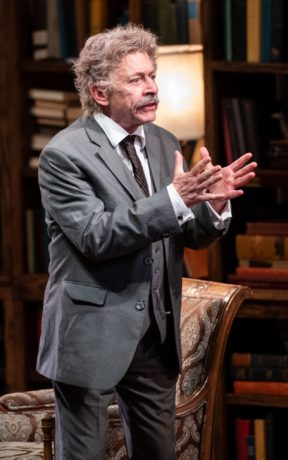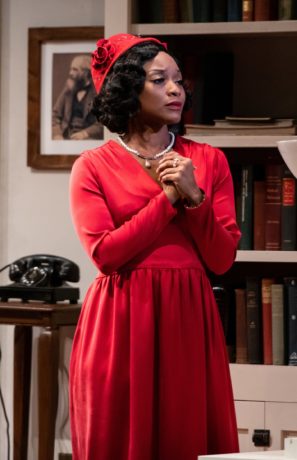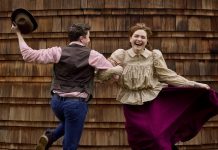My Lord, What a Night, a new play by Deborah Brevoort at the Contemporary American Theater Festival in Shepherdstown, West Virginia, explores the relationship between two 20th-century greats in very different fields: theoretical physicist Albert Einstein and concert singer Marian Anderson. Both at the height of their fame in 1937, they meet when Anderson, denied a hotel room in Princeton, New Jersey on the basis of race, spends the night as a guest of Einstein.

The circumstances, and their long friendship thereafter, are real. Brevoort uses their meeting as a means of exploring not only their personal ties, but their place in the social and political struggles of their time. She does so by adding to the mix two important, but less celebrated figures: Abraham Flexner, an educational reformer and manager of philanthropy, who created the Institute for Advanced Study at Princeton, where Einstein worked after leaving Europe in the midst of Nazi persecution of Jews; and Mary Church Terrell, a longtime leader in the fights for women’s suffrage and equality for African-Americans.
Robert Oppenheimer, in a 1966 New York Review of Books article, said that with Einstein there was always “a wonderful purity at once childlike and profoundly stubborn…The sense of grandeur never left him for a minute, nor his sense of humor.” John Leonard Pielmeier, himself a successful playwright and screenwriter (his credits include Agnes of God) embodies those aspects of Einstein in a thoroughly grounded portrait of a warm, kind, passionate man, who lives with the frustration of knowing that his groundbreaking work is behind him. He fortunately avoids presenting Einstein as the frizzy-haired, too cute, cartoonish figure of the popular culture caricature.
Einstein cared about justice for African-Americans, which he saw as a parallel to Jews’ struggles against anti-Semitism (though he retained some prejudices of his own toward Chinese and other Asians). He was a longtime friend not only of Anderson but of Paul Robeson, and in a 1946 speech at Lincoln University spoke of segregation and racism being “a disease of white people.” His bent toward advocacy, like that of Terrell (Lizan Mitchell), differs from the less confrontational approach of Flexner (Larry Paulsen) and Anderson (Angela Wildflower).
The strongest sequence in Brevoort’s script is the first act’s debate among the characters about how best to contend with discrimination. Should there be overt protest? Einstein and Terrell are for it. The quarrelsome, demanding Flexner, with the funding of the Institute and its ability to rescue Jewish scholars and intellectuals from the Nazis at stake, argues against making waves. Anderson, a figure of impressive dignity, precise speech, unwavering self-control and courtesy, with ramrod-straight physicality, wants to let her music convey the message. Wildflower’s physicality becomes more relaxed at the outset of the second act, set two years later, as she becomes more comfortable in Einstein’s company. After Einstein mentions the apocalyptic potential of nuclear weapons, she sings a beautiful rendition of the end-times spiritual “My Lord, What a Morning,” and her body and emotions become fully engaged, showing the deep feelings she often conceals.
In this dialogue-centered play, physical acting turns out to be a strength. Einstein’s physicality is as informal and loose as Anderson’s is formal and constrained. Terrell’s passion courses through her body, the energy barely able to remain contained. Through no fault of Paulsen’s, Flexner is the least well-realized character of the quartet, serving principally as a foil for the other characters.

David Barber designed the naturalistic, detailed, set of Einstein’s cozy study. The highlights of Therese Bruck’s costumes were Anderson’s outfits, a dramatic red dress in the first act and a softer, rather velvety, blue dress in act two.
Using the Anderson/Einstein meeting as a platform for exploring ideas and moments of historical significance involves, perhaps necessarily, invention and chronological compression. I know of nothing in the historical record that places Terrell and Flexner in Einstein’s home that night in 1937. Likewise, linking the planning for Anderson’s famous Lincoln Memorial concert with Einstein’s participation in a letter warning President Roosevelt of the possibility of an atom bomb, all happening during a February 1939 gathering of the four characters in Einstein’s house, takes a substantial bit of dramatic license. (The actual letter, drafted principally by Hungarian physicist Leo Szilard and signed by Einstein, was not written and sent to FDR until the following August.)
This is the second new play focusing on the Anderson/Einstein relationship to open in this area in a year’s time, the other being Secrets of the Universe (And Other Songs) by Marc Acito. The Acito play focused to a greater extent on the personal relationship of the two principals over time and had a different set of supporting characters. Brevoort’s script is the more polished of the two and provides a fuller realization of Einstein’s character.
As the second act draws to a conclusion, Anderson looks forward to the opportunity to sing in front of the Lincoln Memorial as a way of moving toward a more just and inclusive society, through the power of her music. With the play opening on this July 5, the contrast with current events could not be more bitterly ironic.
Running Time: Two hours and 10 minutes, including one intermission.
My Lord, What a Night plays through July 28 at the Contemporary American Theater Festival, the venue being the Frank Center on the Shepherd University campus, 260 University Drive, Shepherdstown, WV. For tickets, call 800-999-2283 (CATF), extension 1, or go online.




